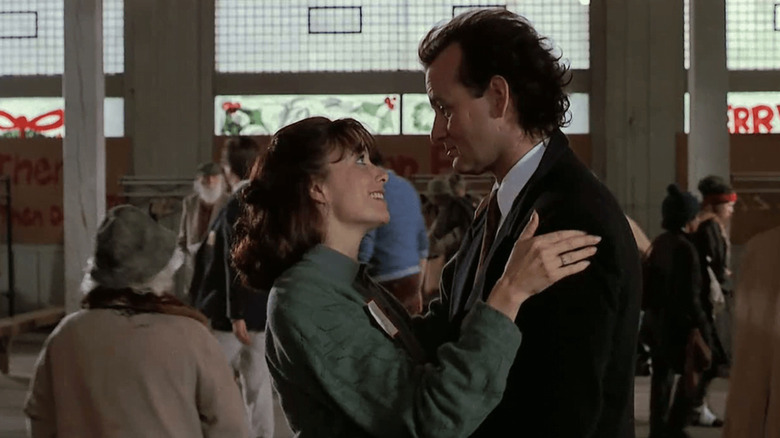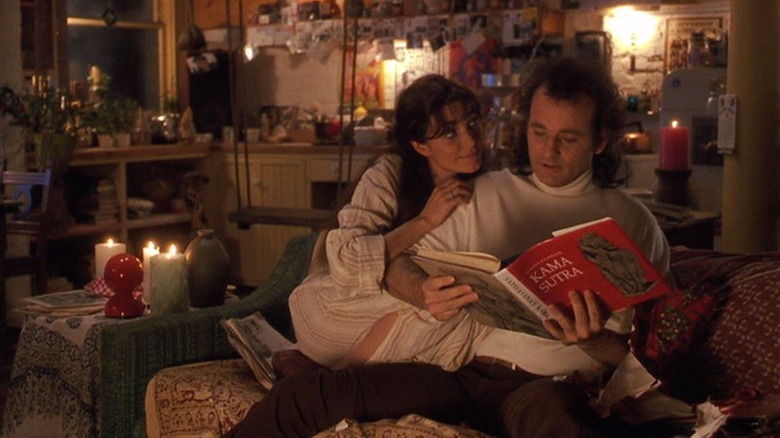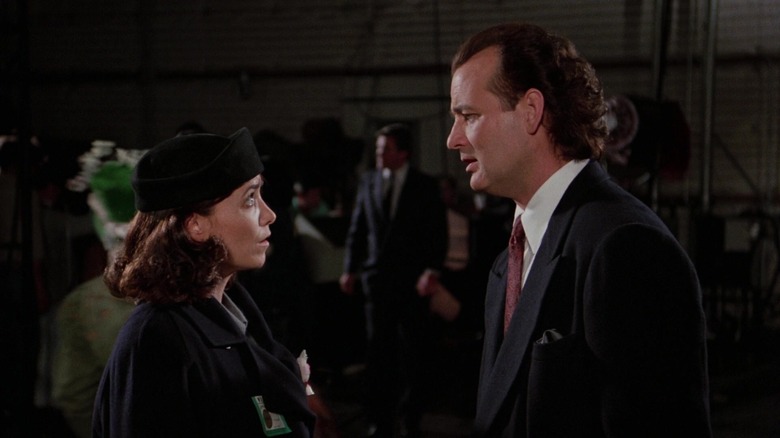Karen Allen Thinks She Knows Why Bill Murray Went So Off-Script With Scrooged
Ad-libbing is an art relished by many of the great comedy actors of our time, like Steve Martin, the late John Candy, and Robin Williams, just to name a few. It helps actors add their own unique flavor to their respective roles, which makes for more authentic and natural performances. The downside is that capturing actors' off-the-cuff quips can cause complications on set, as was the case with Martin and Candy on the holiday classic "Planes, Trains and Automobiles." Another example can be found in yet another holiday classic: 1988's "Scrooged."
In the movie, which is a modern update to Charles Dickens' 1983 novella "A Christmas Carol," Bill Murray plays Frank Cross, a young Ebenezer Scrooge-like TV executive who is ironically the showrunner of an upcoming live production of "A Christmas Carol." Before the show, he is visited by the Ghosts of Christmas Past, Present, and Future. They respectively show him his evil origin story, the negative impact of his current actions have on his co-workers, and finally, the somber ending to his miserable life. This prompts Cross' abrupt change of heart.
Murray improvised so much on set that it led to clashes with the film's director, the late Richard Donner, which was just one of a number of issues that brought the two at odds. Playing Murray's love interest Claire, Karen Allen experienced Murray's predilection for the ad-lib firsthand and offered some insight on why he went so off-script with "Scrooged."
'I think Bill had a resistance to saying the lines that were written'
In a 2018 interview with Vulture, Karen Allen reflected on Bill Murray ad-libbing in "Scrooged," suggesting it was part of his process:
"I think Bill had a resistance to saying the lines that were written, but often he did know them. He had learned them. And sometimes, he would just need to improvise for a while to get to the place where he could actually say the lines. His dialogue came out of a more spontaneous place inside him. So he had his own kind of process."
The idea that Murray resisted reading the lines from the script is interesting because he helped develop the screenplay. Murray disliked the original "Scrooged" script, and helped screenwriters Mitch Glazer and the late Michael O'Donoghue craft a new draft. In a 1990 interview with the late renowned movie critic Roger Ebert, Murray lauded the shooting script and opined the movie could have been "really, really great" before he called out Richard Donner's directorial style.
So if Murray liked the script — and even contributed to its development — why improvise? My theory is that improvising helped the "Ghostbusters" star feel comfortable. Up until that point, Murray had found his biggest success from being a part of ensemble casts, working alongside other sketch comedy veterans like John Candy, Dan Aykroyd, and Rick Moranis. It makes sense that ad-libbing would be a big part of the on-set culture for people with backgrounds in improvisational comedy and was — as Allen suggested — just part of Murray's process for getting into a role.
He turned to what he knew best: Improv
Before "Scrooged," "Ghostbusters," and even "Saturday Night Live," Bill Murray began his career at The Second City, the revered Chicago comedy club known for training many improv gurus including John Candy and Chris Farley, Steve Carrell. There, Murray developed the natural instinct to ad-lib.
Karen Allen also suggested that Murray relied on his improv experience to help him keep the tone fresh. "So, I thought that Bill's improvising was his way of getting what he needed," she told Vulture. "He didn't like to rehearse. He wanted things to stay very 'for the first time.' So a lot of times, I feel like he used improvisation to find his way to enter scenes."
Maybe — just maybe — Murray ad-libbed with the intent of ticking off his director, with whom he had big problems. One of the issues he had with Richard Donner was that the director badgered him perform his lines louder, and louder; this explains why Frank Cross is one over-the-top yelling son-of-a-gun.
Regardless of his reasons, Goldthwait definitely bore the brunt of Bill Murray's improv on "Scrooged." Perhaps in a passive-aggressive effort to show his disdain for the dramatics, while shooting one scene that called for him to shout his lines, Murray improvised and grabbed and wildly twirled Bob Goldthwait, who plays one of Frank's subordinates. Unfortunately, Goldthwait flew out of control and the back of his head hit an elevator, briefly knocking him unconscious. At the end of the day, Goldthwait was fine — and it made for a hilarious bit in "Scrooged."


